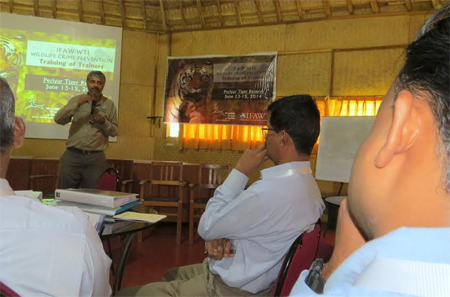Periyar (Kerala), June 13, 2014: Even as the FIFA World Cup fever grips the globe, around 13 wildlife crime specialists, lawyers and biologists committed to build capacity of the frontline staff saving India’s wildlife, are undergoing a special training in Periyar Tiger Reserve in south India, beginning today.
Organised by the International Fund for Animal Welfare – Wildlife Trust of India, the three-day ‘Training of Trainers’ for effective wildlife crime prevention, will ensure maintenance of quality in training imparted to frontline staff under its Van Rakshak (Guardians of the Wild) Project.
In addition to IFAW-WTI staff, the resource persons also included retired divisional forest officer – conservationist James Zacharias, biologist Dr PO Nameer.

Till date, over 13000 frontline staff, at an annual average of 1000 individuals, have been trained and equipped by the Van Rakshak Project (VRP) in India. The project also provides free insurance cover to more than 20000, ensuring quick relief of around Rs 100,000 to their families in case of injuries or death on duty.
“We started VRP in 2001, as there was a critical need to ensure that the guardians of our natural heritage are looked after as well,” said Vivek Menon, Executive Director – WTI and Regional Director of IFAW for South Asia. “Since then, the programme has evolved significantly, and along the course we have learned a lot ourselves.”
One of the crucial learning was the need to have highly-motivated and knowledgeable trainers, who are able to mobilise the ground force that saves the country’s wildlife.
Accordingly, IFAW-WTI has been conducting the ‘training of trainers’. “This has other benefits too,” adds Aniruddha Mookerjee, Chief Mentor to the trainers. “We are increasing the number of qualified trainers in different regions of the country, building a sort of network. Based from these regions, they are also more accessible to the Forest Department in times of need.”
Several previous participants to these trainings, particularly lawyers, have been deputed (for several days a month) to help Forest Departments clear up the back-log.
“The plan is to go local,” says Jose Louies, Regional Head – South India, and a VRP trainer. “In states where we train, we have also been recommending to the authorities, to select and maintain a group of promising frontline staff, who not only lead the others in various aspects of wildlife crime prevention including investigation, evidence collection, accurate filing of legal papers, etc, but also may be honed into trainers themselves.”
The trainees to the current session include senior Wildlife Crime Control Bureau authorities from Delhi, Mumbai and Kochi, lawyers from Uttar Pradesh, Maharashtra, Gujarat and Jammu & Kashmir, and members of Wildlife Institute of India and Amity University in addition to IFAW-WTI staff.
Sessions broadly include effective communication, creating the right environment for learning and developing soft skills to deal with adult students.
Just undergoing this training doesn’t entitle one to become a trainer, however. Although they are given opportunities, for one to become a certified VRP trainer, they have to clear the examination at the end of the session.